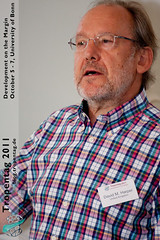resilience

Tropentag Poster Session Diary
Thu, 09/21/2017 - 13:14 — marlemkeAs such, we want to know how nature behaves. We want to mimic it, and often we want to be in control of it. We sometimes fight it, and sometimes cooperate with it.
We experiment with biological agents such as fungal isolates to fight root-knot nematodes on pineapple plantations in Kenya to avoid unnecessary pesticide use. Or we compare a conventional single-culture cacao cropping system with a agroforestry system, a natural, resilient system that copes with rapid changing abiotic factors due to climate change. Of course, we don't want to deal with the origins of the problem, which are usually man-made. What about reducing waste? Rethinking nutrition? Learning to make do with less? Ultimately, we all strive for the same: living our dreams.
CIAT celebrates its 45 years anniversary
Sat, 09/22/2012 - 14:30 — De-Registered UserGIZ – Resilience is about decreasing vulnerability
Thu, 09/20/2012 - 15:30 — De-Registered UserSoil is back on the agenda
Wed, 09/19/2012 - 19:50 — De-Registered User Dr. Deborah Bossio
At the beginning of her speech, Dr. Bossio speaks to the audience about food issues such as chronicle hunger and yield gaps. She points out that the population density is high in areas of quality crop land, showing maps from the African continent found on the website of the Harvestchoice. She also highlights that soils and land use are central to planetary boundaries (climate change, chemical pollution, phosphorus cycle, nitrogen cycle, etc).
Land use changes...some facts!
Dr. Deborah Bossio
At the beginning of her speech, Dr. Bossio speaks to the audience about food issues such as chronicle hunger and yield gaps. She points out that the population density is high in areas of quality crop land, showing maps from the African continent found on the website of the Harvestchoice. She also highlights that soils and land use are central to planetary boundaries (climate change, chemical pollution, phosphorus cycle, nitrogen cycle, etc).
Land use changes...some facts!
Göttigen and Kassel Universities Collaborate to host the Tropentag Conference 2012
Wed, 09/19/2012 - 19:47 — De-Registered UserThe Tropentag conference this year has been organized by the Universities of Göttigen and Kassel that are currently cooperating in green areas of research. This cooperation between the 2 universities started in 2005 with synergies that extend to shared professorships and a joint Masters’ Programme on Sustainable International Agriculture that focuses on 3 key areas of agriculture: international organic agriculture, tropical agriculture and agribusiness and rural development economies. The joint research focuses on agroecological problems and the resilience of food production systems which is the theme of the tropentag this year.
Stuck under the Weather
Wed, 10/19/2011 - 10:10 — De-Registered UserThe Multiple Collapse of Lake Naivasha - Approaching the Complexity in Social-Ecological Systems
Sat, 10/08/2011 - 20:34 — De-Registered User David M. Harper, from the Department of Biology at the University of Leicester, is doing research at Lake Naivasha in Kenya for 30 years now. As an ecologist, he tried to understand the straight forward limnology of the lake. "And then I realised after about three or four years that the reason that the lake was functioning unpredictably was because it was full of alien species."
What he learnt during this time reveals a lot what science is about. Simple explanations may be right for simple problems. But when it comes to ecological dynamics being influenced by humans and the other way around there is no such thing as simplicity. Therefore a more comprehensive approach is needed than a single discipline can offer.
That is why Mr. Harper's work is an invaluable contribution to the understanding of the endogenous functioning of the system. But how to deal with external shocks, changes in governing institutions or the drastic increase in population? What are the consequences for the demand towards the lake? Can illegal water abstraction be prohibited by the existing institutions?
David M. Harper, from the Department of Biology at the University of Leicester, is doing research at Lake Naivasha in Kenya for 30 years now. As an ecologist, he tried to understand the straight forward limnology of the lake. "And then I realised after about three or four years that the reason that the lake was functioning unpredictably was because it was full of alien species."
What he learnt during this time reveals a lot what science is about. Simple explanations may be right for simple problems. But when it comes to ecological dynamics being influenced by humans and the other way around there is no such thing as simplicity. Therefore a more comprehensive approach is needed than a single discipline can offer.
That is why Mr. Harper's work is an invaluable contribution to the understanding of the endogenous functioning of the system. But how to deal with external shocks, changes in governing institutions or the drastic increase in population? What are the consequences for the demand towards the lake? Can illegal water abstraction be prohibited by the existing institutions?




